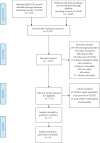Extracorporeal Membrane Oxygenation in Cardiogenic Shock due to Acute Myocardial Infarction: A Systematic Review
- PMID: 32382560
- PMCID: PMC7193268
- DOI: 10.1155/2020/6126534
Extracorporeal Membrane Oxygenation in Cardiogenic Shock due to Acute Myocardial Infarction: A Systematic Review
Abstract
Background: Cardiogenic shock is associated with high mortality, despite new strategies for reperfusion therapy. Short-term circulatory support devices may provide adequate support for appropriate myocardial and organ perfusion.
Objectives: This review is aimed at evaluating the impact on survival when using venoarterial extracorporeal membrane oxygenation (V-A ECMO) in patients with cardiogenic shock due to acute myocardial infarction (AMI).
Methods: We performed a systematic review that included studies using V-A ECMO in patients with cardiogenic shock. Time on ECMO, side effects, and the number of deceased patients, transplanted or upgraded to durable assist devices were analysed. Literature search was done using PubMed/MEDLINE (inception (1969) to January 10, 2019), ProQuest (inception (January 14, 1988) to January 10, 2019), and clinicaltrials.gov (inception (September 12, 2005) to January 10, 2019), by 2 authors. This protocol is registered with PROSPERO (no. CRD42019123982).
Results: We included 9 studies with a total of 1,998 adult patients receiving V-A ECMO for AMI-induced cardiogenic shock. Survival rate varied from 30.0% to 79.2% at discharge and from 23.2% to 36.1% at 12 months. Time on ECMO varied between 1.96 and 6.0 days. Reported serious adverse events were gastrointestinal bleeding (3.6%) and peripheral complications (8.5%).
Conclusion: The use of V-A ECMO among patients with AMI-induced cardiogenic shock may provide survival benefits. However, V-A ECMO treatment effects are inconclusive because of limitations in cohort design and reporting.
Copyright © 2020 Marius Andrei Zavalichi et al.
Conflict of interest statement
The authors declare that they have no conflicts of interest.
Figures
References
-
- Goldberg R. J., Gore J. M., Thompson C. A., Gurwitz J. H. Recent magnitude of and temporal trends (1994-1997) in the incidence and hospital death rates of cardiogenic shock complicating acute myocardial infarction: the second national registry of myocardial infarction. American Heart Journal. 2001;141(1):65–72. doi: 10.1067/mhj.2001.111405. - DOI - PubMed
Publication types
MeSH terms
LinkOut - more resources
Full Text Sources
Medical


